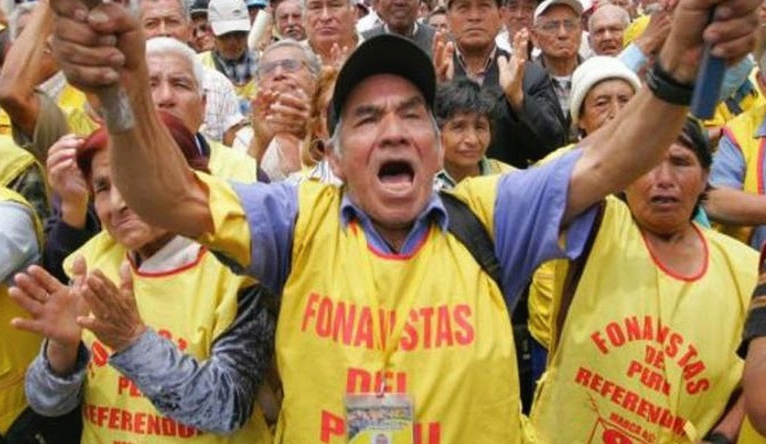That Thursday, Pedro, 80 years old, got up quickly, not to start his day as a cab driver, but to go to the office of the Banco de la Nación where he would collect, for the first time, his contribution to the National Housing Fund (Fonavi). He had contributed for 12 years to this fund, a mandatory contribution fund for workers and employees created by decree law during the military dictatorship in 1979, in Peru, and was canceled in 1998 during the Fujimori dictatorship. Decades after the failed project ended, the government would finally pay back all that its affiliates had invested. However, after being attended by a kilometer-long line of senior citizens, Pedro was paid 46 soles (US$12).
According to newspaper reports of the time, the initiative was designed to provide access to social housing and the granting of loans for the construction of housing for the working class in order to solve the housing deficit, since the demand for housing exceeded the supply, as a result of the growing urbanization in the cities. The regime of that time, commanded by General Francisco Morales Bermúdez, established the mandatory contribution system specifically for housing.
Although initially housing units were created and remain to this day, those assigned by hand, mortgage loans to people with political influence, and incomplete housing projects, together with numerous allegations of corruption in the management of the fund, led to the end of the project.
Its disappearance gave way to the MiVivienda Fund (Housing Promotion Mortgage Fund), which is currently under the administration of the Peruvian Ministry of Housing, Construction and Sanitation. However, since those days, Fonavi’s contributors, colloquially called “fonavistas”, fought tirelessly to demand the return of the money contributed for almost 20 years.
In 2010, after a referendum, the group achieved the approval of a law that provided for the return of the money. The visibility of the movement was such that the group of former contributors obtained the official registration of a political party, Direct Democracy. Under the symbol of a yellow house. From 2013 onwards, the party has participated in presidential, congressional, regional, and municipal elections, but has not managed to obtain any elected office.
The payment, however, was delayed due to the need for historical records to calculate the amounts to be returned. Until October 2022, when the COVID-19 pandemic officially ended in Peru, a commission was set up to guarantee the return of the money. A year later, at the end of December 2023, the contribution began to be returned but in derisory amounts due to several factors, one of them referring to a ruling of the Constitutional Court (TC) that determined that the return should come from the state, but also from the employer companies that cut the mandatory contribution from the workers’ salaries to allocate it to Fonavi. But the companies either no longer exist or have not been held responsible.
In addition, the regulation that orders the return of the contributions also states that this can be done with “payments on account”, leaving open the possibility that the contributors themselves accredit more time of work than that stipulated to make the calculation. In most cases, however, this is impossible due to the lack of records. Moreover, often, when the victims claim for recognition of the years worked, they are required to provide documents that, in many cases, do not exist, making the claims impossible. And as if this were not enough, there is also the devaluation of the amount due to the change of currency from Intis to Soles in June 1991. Therefore, it is impossible to know the amount that each senior citizen will receive.
What is known is that adding the contributions of all affiliated Peruvians, the state received approximately 3,000 million soles during the quarter of a century in which the fund was active. And according to Fonavi’s registry, until December 2023, 1,200,000 registered elderly people were waiting for reimbursement, which is equivalent to more than 3.5% of the total number of Peruvian citizens.
The special commission created by the Presidency of the Peruvian Council of Ministers, the Government’s executing body, started on Thursday, April 25, the payment of Group 1 of Fonavi’s contributors, which comprises 153 thousand people. The beneficiaries are people with disabilities, people with serious and terminal illnesses, and people over 80 years old, Pedro was there. Group 2, which includes 400 thousand more, will start receiving the payment in mid-July and will benefit, among others, the heirs of deceased Fonavistas.
What could these people do with an income like Pedro’s of about US$12? To give us an idea, at present, the basic family basket in Peru for four members amounts to more than 1,660 soles, or just over US$441, so they will not be able to do much with that amount.
However, this is one more problem in a country where only a little more than 31% of the population is affiliated with a public or private pension system, both of which are seriously challenged by the economic slowdown. In fact, according to the National Institute of Statistics and Informatics (INEI), poverty currently affects 29% of the population.
Years of oblivion, bureaucratic lethargy, and state indolence culminate in the delivery of derisory bonuses that serve no purpose. How can we ask those million people to believe in the state, or their relatives, young voters whose grandparents do not see the return of their contributions?
When the payments began in December 2023, the President of the Republic of Peru, Dina Boluarte, stated that her administration “is committed” to the refunds, which are part of a “legitimate claim”, and questioned that “several governments used these resources for other purposes”.
Let us hope that these are not just words and that this time the rulers attend to the demand of the senior citizens who for decades contributed to Fonavi. There is no right to further undermine the pockets of more than one million senior citizens in Peru. People like Pedro, have lost hope of growing old with a decent pension.
*Translated by Janaína Ruviaro da Silva from the original in Spanish.













